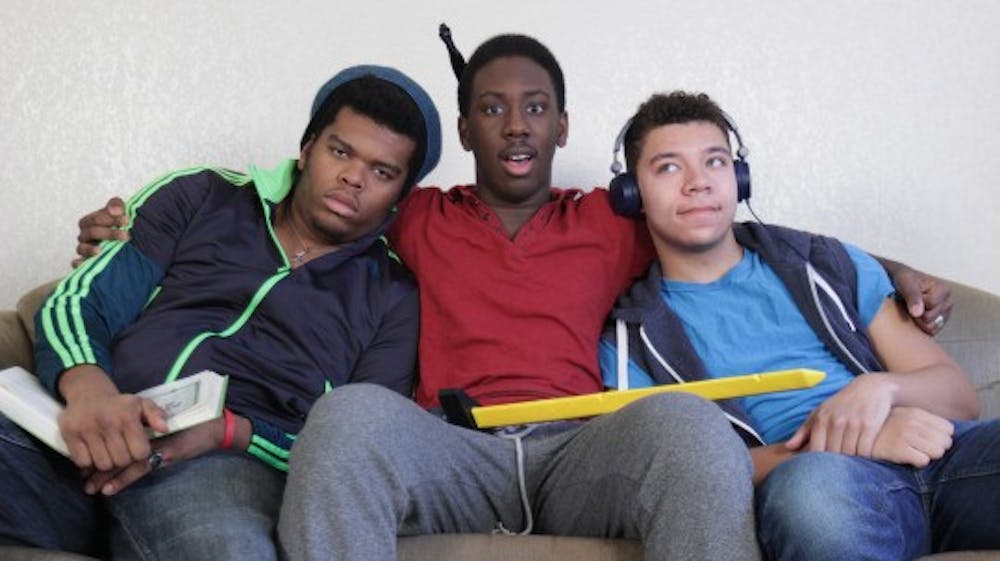Weird Enough to Work Productions gives a behind-the-scenes look at the production company, multimedia by Sydney Spaulding, multimedia reporter.
Lea Silverman
Senior Reporter
A new media production company, Weird Enough Productions,which started at Elon, has a civil rights agenda.
The goal of Weird Enough Productions is to defy common stereotypes in popular culture of African Americans and other minority groups by poking fun at — and bringing to light — the discrimination black students experience at a college with a majority white student body.
Weird Enough Productions was started in October 2014 by senior Rasheed Cheek, alumna Negesti Kaudo ’15, sophomore Aneesha Smith, senior Mia Watkins and senior Tony Weaver who recognized an issue in how African Americans are misrepresented in the media. The group felt there was a niche that was not being filled and decided it was their job to fill it.
“Are we artists? Yes, we are making art,” said Weaver, the company’s CEO and head writer. “But we are making art with a purpose, and I think that’s what makes the difference.”
Weaver has always had a passion for independent television, making it easy for him to step into his role as CEO.
Weird Enough Productions began producing original content in the form of a web series in spring 2015 called “Weird Enough to Work.” The show follows three “weirdos” — Grayson Whithers, Kyle Waterman and Terry Sullivan — who don’t necessarily fit in at Wellham University.
The idea for the show came from Elon’s fall 2014 Triple Impact Challenge, a competition sponsored by the Doherty Center for Entrepreneurial Leadership where student teams present their solution to a particular problem in the world.
The team won first place, and with the $500 winnings, Weird Enough Productions has been able to produce higher-quality videos and continue to create content-driven pieces.
There are currently three episodes, which can be found on their website or YouTube channel, WeirdEnoughProductions. Each episode is around five minutes long, featuring relatable and hilarious college life situations.
The first episode, “The Rave Cave,” is about the three friends returning to college. Whithers and Sullivan would rather stay home, watch documentaries and listen to music. Waterman, played by Weaver, wants to get out of the house and go to a party at “Rave Cave,” that a fraternity brother told him about while turning him away from his own party.
The “Rave Cave” ends up not existing.
“That happened to me as a freshman,” Weaver said. “That’s a true story. You look at ‘Rave Cave’ and it’s like, ‘Oh that’s so funny they got invited to a place that didn’t exist.’ But if you were to show that to one of my black friends, he would say, ‘Why are the three black guys the only ones who are getting invited to a place that doesn’t exist?’”
The show uses humor to challenge the viewers into thinking about the truth about how black U.S. citizens are treated in these situations.
Students and faculty alike are watching. Naeemah Clark, associate professor of communications, commented on the first episode on YouTube.
“FUN and creative!!! I want to go to the Rave Cave,” she wrote.
While the first episode got some traction, not every follow up has been so popular. The number of views on the three episodes decreases from more than 700 on the first to around 200 views on the third, and the group’s YouTube channel only has 56 subscribers.
But they hope to grow. The Weird Enough Productions team, which started with five members and has grown to around 40, is working hard to promote the web series and the message behind it.
The fourth episode will be coming out after its trailer premieres Sept. 7, and Season Two of “Weird Enough to Work” will start filming during the first week of October.
Weaver said that viewers should expect for season two to delve into the predominantly white campus where the “Weird Enough to Work” characters lives. The inspiration for the fictional campus demographic comes from the diversity, or lack thereof, at Elon.
The storylines aren’t the only thing Elon has provided. The resources Elon has available for its students has helped Weird Enough Productions become larger than the creators could have imagined. They provide not only production materials through Elon Television, but also opportunities to share their show with competitions like the Triple Impact Challenge.
Also, with a support system that includes professors like Clark, Weaver and his team are encouraged to achieve their goals and help the production company continue after he graduates in the spring.


